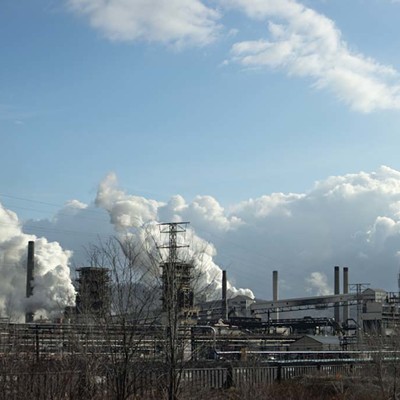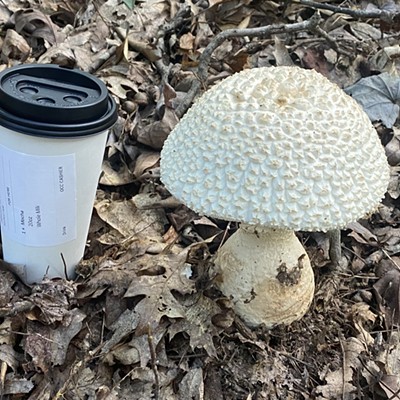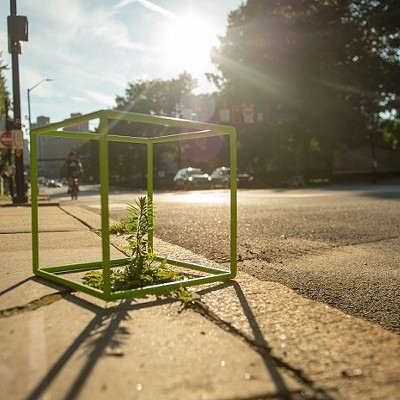According to reports, including Jonathan Bloom's 2010 book American Wasteland, Americans throw out at least 40 percent of the food we produce.
It rots in fields, spoils on trucks, gets tossed into supermarket Dumpsters and kitchen garbage bins. Yearly we generate 34 million tons of food waste, says the U.S. Environmental Protection Agency -- about one in every seven pounds of trash.
Almost all of it gets landfilled. So we're not merely squandering all the energy it took to grow, process, ship and store food we don't really need. We're also burying those vittles ... and letting them decompose, releasing methane, a greenhouse gas 21 times stronger than carbon dioxide. Meanwhile, the valuable nutrients in all the rotten apples, coffee grounds and half-eaten hamburgers remain entombed forever, useless.
It's a bad deal, and getting worse. "We waste 50 percent more food today than we did in 1974," Bloom has written.
These are some of the reasons that on a Tuesday morning Jeff Newman is weaving his way through the shopping carts at the East End Food Co-Op, pushing his own cart full of stuff no grocery customer would buy. Thrice weekly, the Braddock Hills sustainability consultant drives his pickup truck to the store, in North Point Breeze, and fills eight 18-gallon lidded plastic tubs with food scraps -- everything from brown leaves the produce department has stripped from lettuce heads to banana peels from Co-Op café smoothies.
The greens don't even look all that bad.
"Some of it could be edible if I needed it," says Newman. "I haven't had to go there yet."
It all adds up -- to as much as 4 tons monthly, says Newman. His Steel City Soils makes sure those scraps become dirt: nutrient-rich compost and worm castings for local farms and gardens.
Newman, 27, says Steel City Soils is as much avocation as business. His only customers so far are the Co-Op and Friendship's Quiet Storm restaurant. Their modest fees make the job a break-even concern. Half the scraps go to Blackberry Meadows Farm, where finished compost is bagged for resale as "Mo Bitty Bits" (sold at outlets including the Co-Op). Most of the rest is donated to urban farm Braddock Farms' composting program, though a portion feeds a small worm farm that produces castings (i.e., worm poop) for resale.
Compost is created when bacteria, fungi and insects digest organic matter. Its benefits are many. Emptier landfills make less methane, and compost emits none. Compost also enriches and stabilizes soil for agricultural and other uses. It reduces the need for irrigation and harmful chemical fertilizers, and even helps keep plants healthy and pest-free.
Composting isn't new, of course. In agrarian cultures, it's standard. Even today, cities including Seattle, Toronto and San Francisco collect organic waste curbside, just like Pittsburgh does with non-food recyclables. San Francisco sells its compost to area vineyards.
Even here, Newman isn't the first to collect food scraps: For instance, Pittsburgh-based AgRecycle Inc., founded in 1991, uses food waste to generate compost for everything from industrial-brownfield reclamation to rosebeds.
AgRecycle formerly collected the Co-Op's food waste, too, helping the store go from landfilling 68 percent of its waste by weight, in 2009, to landfilling just 9 percent today, says Co-Op general manager Rob Baran. The Quiet Storm, where Newman has been collecting since last summer, has seen comparable results. "We've at least halved our trash since he's started picking up," says kitchen manager Sheryl Johnston. "It's super-simple for us."
AgRecycle, whose customers include Whole Foods and Six Penn Restaurant, is an exponentially bigger operation. Newman's smaller scale is largely intentional: Industrial-scale wastage shouldn't be solved, he says, with industrial-scale remediation, which only compounds problems like heavy fossil-fuel use.
In fact, the Pitt engineering grad (who grew up on an Erie County farm) says his truck-based composting model is itself transitional. Of course homes and businesses should reduce their waste by buying smarter.
But because a truly sustainable society needs to minimize energy use, Newman would also like to see more home composting, more community gardens, and neighboring restaurants going in together on worm farms. The less you waste, certainly, the better; but the more you're local, better still.














